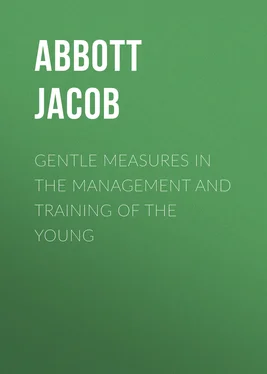Jacob Abbott - Gentle Measures in the Management and Training of the Young
Здесь есть возможность читать онлайн «Jacob Abbott - Gentle Measures in the Management and Training of the Young» — ознакомительный отрывок электронной книги совершенно бесплатно, а после прочтения отрывка купить полную версию. В некоторых случаях можно слушать аудио, скачать через торрент в формате fb2 и присутствует краткое содержание. Жанр: foreign_edu, pedagogy_book, upbringing_book, на английском языке. Описание произведения, (предисловие) а так же отзывы посетителей доступны на портале библиотеки ЛибКат.
- Название:Gentle Measures in the Management and Training of the Young
- Автор:
- Жанр:
- Год:неизвестен
- ISBN:нет данных
- Рейтинг книги:5 / 5. Голосов: 1
-
Избранное:Добавить в избранное
- Отзывы:
-
Ваша оценка:
- 100
- 1
- 2
- 3
- 4
- 5
Gentle Measures in the Management and Training of the Young: краткое содержание, описание и аннотация
Предлагаем к чтению аннотацию, описание, краткое содержание или предисловие (зависит от того, что написал сам автор книги «Gentle Measures in the Management and Training of the Young»). Если вы не нашли необходимую информацию о книге — напишите в комментариях, мы постараемся отыскать её.
Gentle Measures in the Management and Training of the Young — читать онлайн ознакомительный отрывок
Ниже представлен текст книги, разбитый по страницам. Система сохранения места последней прочитанной страницы, позволяет с удобством читать онлайн бесплатно книгу «Gentle Measures in the Management and Training of the Young», без необходимости каждый раз заново искать на чём Вы остановились. Поставьте закладку, и сможете в любой момент перейти на страницу, на которой закончили чтение.
Интервал:
Закладка:
There will be occasion, however, to refer to this subject more fully in a future chapter.
CHAPTER VI. REWARDING OBEDIENCE
The mode of action described in the last two chapters for training children to habits of obedience consisted in discouraging disobedience by connecting some certain, though mild and gentle disadvantage, inconvenience, or penalty, with every transgression. In this chapter is to be considered another mode, which is in some respects the converse of the first, inasmuch as it consists in the encouragement of obedience, by often—not necessarily always—connecting with it some advantage, or gain, or pleasure; or, as it may be stated summarily, the cautious encouragement of obedience by rewards.
This method of action is more difficult than the other in the sense that it requires more skill, tact, and delicacy of perception and discrimination to carry it successfully into effect. The other demands only firm, but gentle and steady persistence. If the penalty, however slight it may be, always comes, the effect will take care of itself. But judiciously to administer a system of rewards, or even of commendations, requires tact, discrimination, and skill. It requires some observation of the peculiar characteristics of the different minds acted upon, and of the effects produced, and often some intelligent modification of the measures is required, to fit them to varying circumstances and times.
If the bestowing of commendation and rewards is made a matter of mere blind routine, as the assigning of gentle penalties may be, the result will become a mere system of bribing , or rather paying children to be good; and goodness that is bought, if it deserves the name of virtue at all, is certainly virtue of a very inferior quality.
Whether a reward conferred for obedience shall operate as a bribe, or rather as a price paid—for a bribe , strictly speaking, is a price paid, not for doing right, but for doing wrong—depends sometimes on very slight differences in the management of the particular case—differences which an undiscriminating mother will not be very ready to appreciate.
A mother, for example, going into the village on a summer afternoon, leaves her children playing in the yard, under the general charge of Susan, who is at work in the kitchen, whence she can observe them from time to time through the open window. She thinks the children will be safe, provided they remain in the yard. The only thing to be guarded against is the danger that they may go out through the gate into the road.
Under some circumstances, as, for example, where the danger to which they would be exposed in going into the road was very great, or where the mother can not rely upon her power to control her children's conduct by moral means in any way, the only safe method would be to fasten the gate. But if she prefers to depend for their safety on their voluntary obedience to her commands, and wishes, moreover, to promote the spirit of obedience by rewarding rather than punishing, she can make her rewards of the nature of hire or not, according to her mode of management.
If she wishes to hire obedience, she has only to say to the children that she is going into the village for a little time, and that they may play in the yard while she is gone, but must not go out of the gate; adding, that she is going to bring home some oranges or candies, which she will give them if she finds that they have obeyed her, but which she will not give them if they have disobeyed.
Such a promise, provided the children have the double confidence in their mother which such a method requires—namely, first, a full belief that she will really bring home the promised rewards, if they obey her; and secondly—and this is a confidence much less frequently felt by children, and much less frequently deserved by their mothers—a conviction that, in case they disobey, no importunities on their part or promises for the next time will induce their mother to give them the good things, but that the rewards will certainly be lost to them unless they are deserved, according to the conditions of the promise—in such a case—that is, when this double confidence exists, the promise will have great influence upon the children. Still, it is, in its nature, hiring them to obey. I do not say that this is necessarily a bad plan, though I think there is a better. Children may, perhaps, be trained gradually to habits of obedience by a system of direct rewards, and in a manner, too, far more agreeable to the parent and better for the child than by a system of compulsion through threats and punishment.
But there is another way of connecting pleasurable ideas and associations with submission to parental authority in the minds of children, as a means of alluring them to the habit of obedience—one that is both more efficient in its results and more healthful and salutary in its action than the practice of bestowing direct recompenses and rewards.
Suppose, for example, in the case above described, the mother, on leaving the children, simply gives them the command that they are not to leave the yard, but makes no promises, and then, on returning from the village with the bonbons in her bag, simply asks Susan, when she comes in, whether the children have obeyed her injunction not to leave the yard. If Susan says yes, she nods to them, with a look of satisfaction and pleasure, and adds: "I thought they would obey me. I am very glad. Now I can trust them again."
Then, by-and-by, towards the close of the day, perhaps, and when the children suppose that the affair is forgotten, she takes an opportunity to call them to her, saying that she has something to tell them.
"You remember when I went to the village to-day, I left you in the yard and said that you must not go out of the gate, and you obeyed. Perhaps you would have liked to go out into the road and play there, but you would not go because I had forbidden it. I am very glad that you obeyed. I thought of you when I was in the village, and I thought you would obey me. I felt quite safe about you. If you had been disobedient children, I should have felt uneasy and anxious. But I felt safe. When I had finished my shopping, I thought I would buy you some bonbons, and here they are. You can go and sit down together on the carpet and divide them. Mary can choose one, and then Jane; then Mary, and then Jane again; and so on until they are all chosen."
It may, perhaps, be said by the reader that this is substantially the same as giving a direct reward for the obedience. I admit that it is in some sense substantially the same thing, but it is not the same in form. And this is one of those cases where the effect is modified very greatly by the form. Where children are directly promised a reward if they do so and so, they naturally regard the transaction as of the nature of a contract or a bargain, such that when they have fulfilled the conditions on their part the reward is their due, as, indeed, it really is; and they come and demand it as such. The tendency, then, is, to divest their minds of all sense of obligation in respect to doing right, and to make them feel that it is in some sense optional with them whether to do right and earn the reward, or not to do right and lose it.
In the case, however, last described, which seems at first view to differ only in form from the preceding one, the commendation and the bonbons would be so connected with the act of obedience as to associate very agreeable ideas with it in the children's minds, and thus to make doing right appear attractive to them on future occasions, while, at the same time, they would not in any degree deprive the act itself of its spontaneous character, as resulting from a sense of duty on their part, or produce the impression on their minds that their remaining within the gate was of the nature of a service rendered to their mother for hire, and afterwards duly paid for.
Читать дальшеИнтервал:
Закладка:
Похожие книги на «Gentle Measures in the Management and Training of the Young»
Представляем Вашему вниманию похожие книги на «Gentle Measures in the Management and Training of the Young» списком для выбора. Мы отобрали схожую по названию и смыслу литературу в надежде предоставить читателям больше вариантов отыскать новые, интересные, ещё непрочитанные произведения.
Обсуждение, отзывы о книге «Gentle Measures in the Management and Training of the Young» и просто собственные мнения читателей. Оставьте ваши комментарии, напишите, что Вы думаете о произведении, его смысле или главных героях. Укажите что конкретно понравилось, а что нет, и почему Вы так считаете.












